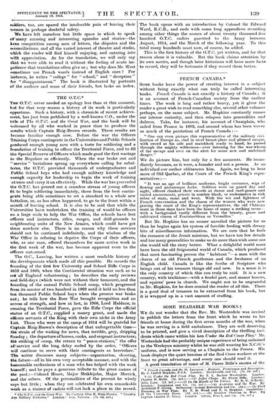THE O.T.C.*
Tins O.T.C. never needed an apology less than at this moment, but for that very reason a history of its work is particularly opportune. Such a history, with a chronicle of recent achieve- ment, has just been published by a well-known C.O., under the title of The O.T.C. and the Great War, and the book will be welcomed by all who worked in peace time to produce the results -which- Captain Haig-Brown records. These results are become familiar enough now. Before the war the Officers Training Corps contingents in the Universities and Public Schools produced enough young men with a taste for soldiering and a foundation of training to officer the Territorial Force, and to fill the Special Reserve of Officers which made good the first wastage in the Regulars so efficiently. When the war broke out and " service " battalions sprang up everywhere calling for subal- terr4 the O.T.C. provided thousands of undergraduates and Public School boys who had enough military knowledge and enough capacity for leadership to begin the work of training at once and carry it on effectively. While the war has proceeded the O.T.C. has poured out a ceaseless stream of young officers fit to begin soldiering immediately, those from the best contin- gents being able sometimes to set a standard to a whole new battalion, or, as has often happened, to go to the front within a month of leaving school. It is also to be said that while the Universities have undertaken the training of would-be officers on a large scale to help the War Office, the schools have lent officers and instructors, rifles, ranges, and drill-grounds to neighbouring units of the New Armies, which could have got them nowhere else. There is no reason why these services should not be continued indefinitely, and the wisdom of the War Office in refusing to deprive the Corps of their officers, who, as one man, offered themselves for more active work in the first week of the war, has become apparent even to the officers concerned: The 0.C., Lancing, has written a most readable history of the developments which made all this possible. He records the founding of the- first few University and School Rine Corps in 1859 and 1860, when the Continental situation was such as to set all England volunteering ; he describes the early reviews and field-days (which were not without their humours), and the foinding of the annual Public School camp, which progressed from its muster of two hundred in 1889 until it held no less than tea thousand Public School boys when the present war broke out; he tells how the Boer War brought recognition and an access of strength, and how at last, in 1908, Lord Haldane, in creating the Territorial Force, gave the Rifle Corps the official status of an O.T.C., supplied a money grant, and made the officers servants of the King with their own niche in the Army List. Those who were at the camp of 1914 will be grateful for Captain Haig-Brown's description of that unforgettable time— the strain of the waiting for news, that terrible, grey, dripping Sunday ; the departure of horses, cooks, and sergeant instructors; the striking of camp, the return to " peace-stations," the offer eV service and the long, delay ended by the order, " Officers will continue to serve with, their contingents as heretofore." The writer discusses many subjects—organization, shooting, the future all in his own very acceptable manner, and with the honourable enthusiasm of a man who has helped with the work himself ; and he pays a generous tribute' to the great names of the past :—Colonel Hoare, Major Meiklejohn, Major Merrick, and the others. Of the personalities of the present he wisely says but little ; when they are celebrated his own remarkable work as a trainer of cadets will not lack a place in. the record.
• The O.T.C. and the Great War. By Captain Alin R. Haig-Brown. " Country Lilo Military Histories." London : Geo. Sewnes. Lis. 6d. net..I
The book opens with an introduction by Colonel Sir Edward Ward, K.C.B., and ends with some long appendices recording among other things the names of about twenty thousand five hundred O.T.C. cadets gazetted to the Army between August, 1914, and the March of the following year. To this total many hundreds must now, of course, be added.
This is the first history of the O.T.C. yet written, and for that reason alone it is valuable. But the book claims attention by its own merits, and though later historians will have more facts to record, they will be fortunate if they record them better.


















































 Previous page
Previous page